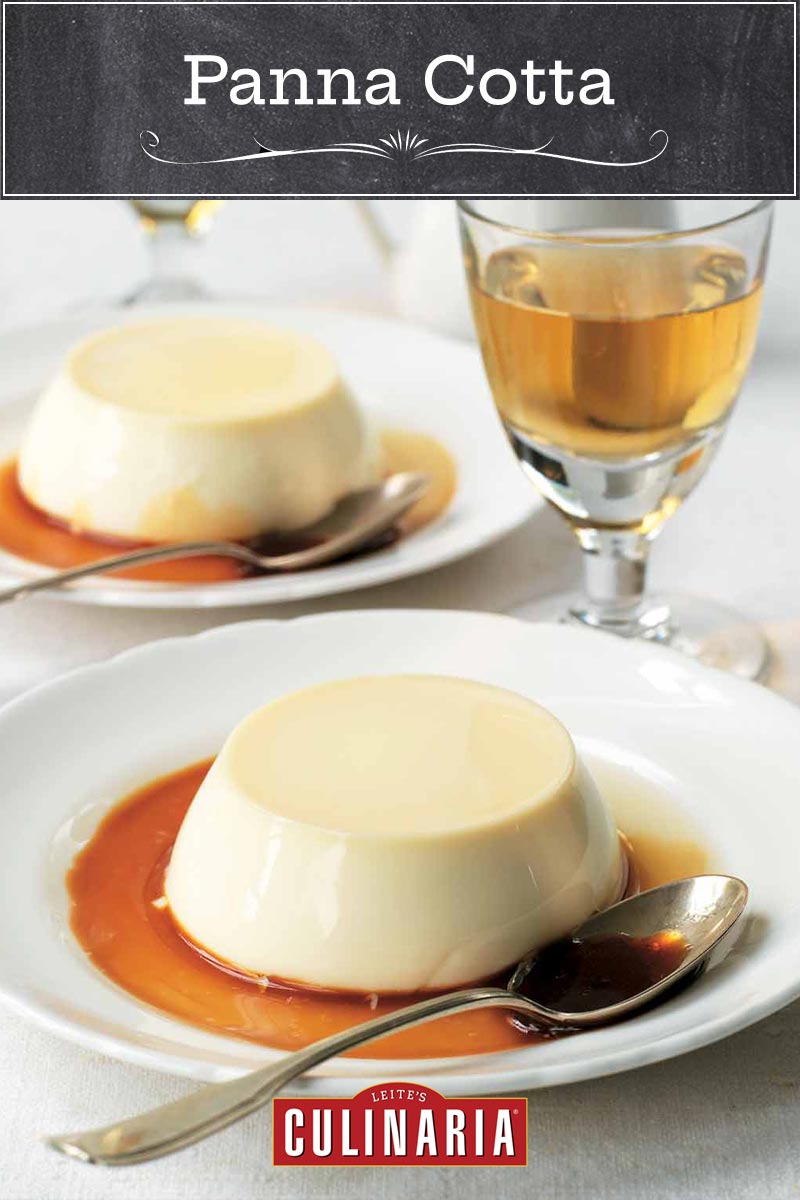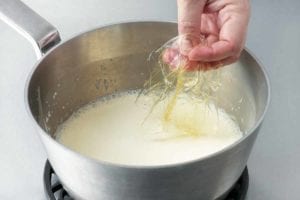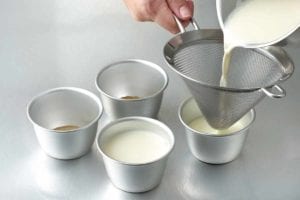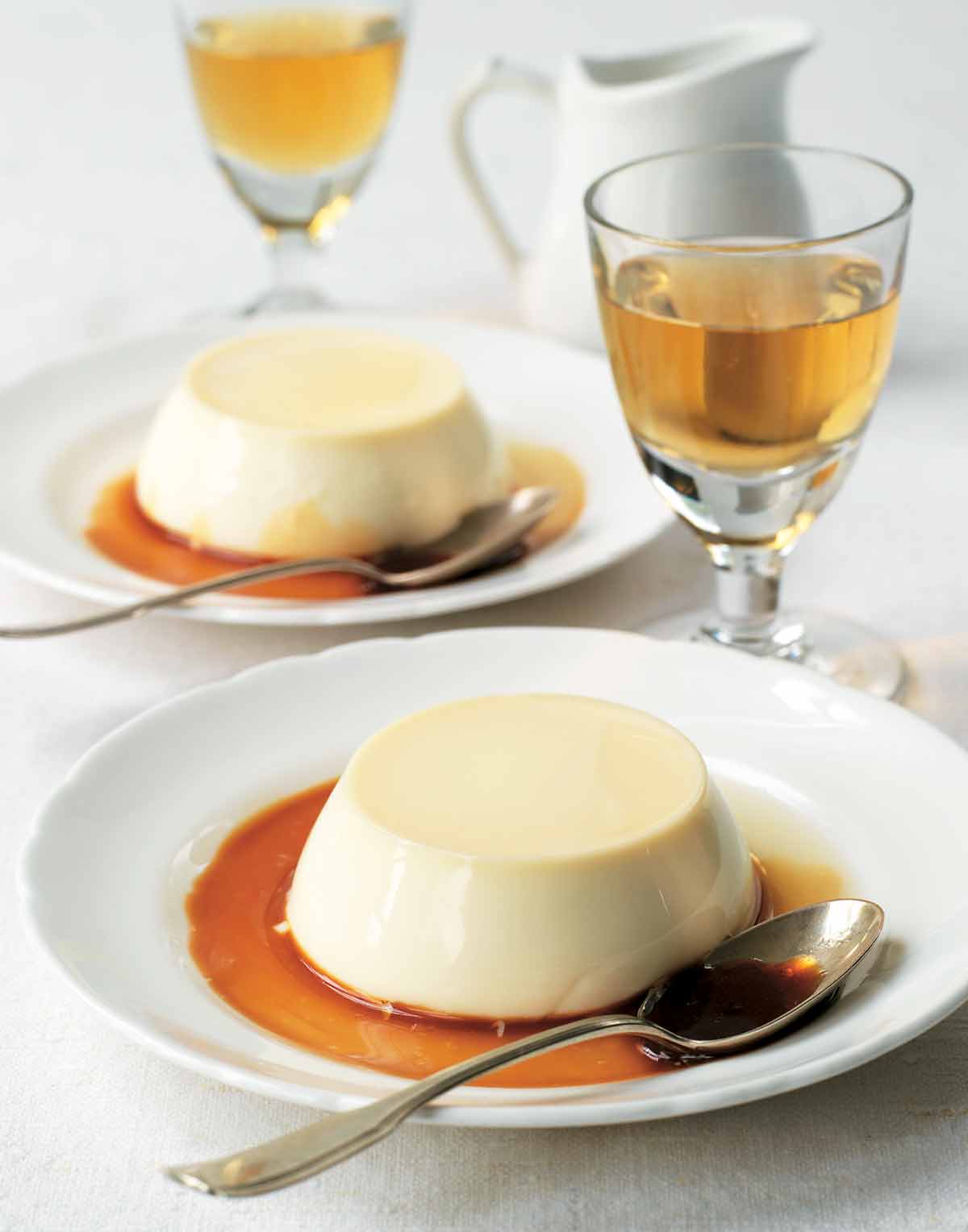
This delicious Piedmontese speciality is gaining in popularity all over Italy and throughout the world. You can make it completely plain, if you like, or add flavorings such as crushed amaretti, coffee, chocolate, soft fruits, citrus zest liqueur—the possibilities are almost endless. The skill of making this dessert lies in getting it to set without being rubbery, so just the right amount of sheet gelatine needs to be used. Trial and error will help you find out what works best for you since different people prefer different textures. –Valentina Harris
Tips on Making Panna Cotta
A few tips and tricks that help make your panna cotta experience as seamless and authentic as possible.
What is panna cotta?
The English translation of the term panna cotta is “cooked cream,” although that really doesn’t do justice to this creamy as sin, subtly flavored, lightly sweetened, melt-in-your-mouth classic dessert that relies on just a few ingredients. Some velvety versions of the recipe call for heavy cream, although we prefer the relative ephemeralness of light cream, which sacrifices nothing in creaminess in the final dessert.
Why is there gelatin in my panna cotta?
The gelatin, as noted above, helps the mixture set and lends it that almost wobbly or jiggly consistency that makes so many of us go weak in the knees. In other words, the gelatin is an integral component of panna cotta and cannot be omitted. Sorry, vegetarians.
Can I make panna cotta ahead of time?
Yes. In fact, the dessert requires several hours of resting for the gelatin to set so you actually have to make it in advance. Sorta handy that way! And the desserts will easily last in the fridge for up to a couple of days before unmolding.
How can I decorate my panna cotta?
The easiest way to spiffy up these easy desserts is to add a final flourish after you unmold them. As you’ll find in the note above, you can sprinkle the plated panna cotta with grated citrus zest, crushed amaretti, shaved chocolate, crushed coffee beans, even a splash of your favorite liqueur. And if you prefer to infuse the flavor into your panna cotta rather than simply add it at the end, stir it in during step 4, once the cream mixtures have been stirred together. Potential candidates include grated citrus zest, a shot of espresso, up to 3 tablespoons liqueur or brandy, or even a couple teaspoons vanilla extract. Truly, the only limit is your imagination.
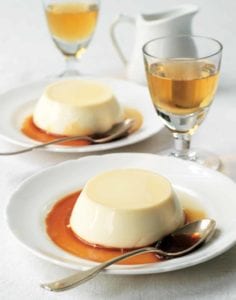
Panna Cotta
Equipment
- Eight small metal molds or ramekins
Ingredients
- 4 cups light cream
- 1/2 cup confectioners’ sugar
- 3 or 4 whole gelatin sheets or 1 envelope powdered gelatin
- 4 tablespoons granulated or superfine sugar (or just blitz granulated sugar in a blender until finely ground but not powdery)
- Grated lemon or orange zest, shaved chocolate, or ground coffee beans (optional)
Instructions
- Set two medium saucepans over medium-low heat and add 2 cups cream to each saucepan. Heat the cream in both saucepans until they almost reach a boil, about 7 minutes.
- To one saucepan of cream, add the confectioners’ sugar and to the other add the gelatin sheets or powdered gelatin.
- Constantly whisk the cream in both saucepans until the confectioners’ sugar and gelatin have completely dissolved and the cream is very hot but not boiling, 1 to 2 minutes.
☞ TESTER TIP: It can be tricky to whisk with both hands at the same time! You may want to ask for some help at the stove.
- In a large bowl, whisk the cream from both saucepans together. Let the mixture cool completely, at least 1 hour.
- Meanwhile, in a small saucepan over low heat, warm the granulated or superfine sugar. Cook, without stirring, until the sugar melts and turns pale golden, anywhere from 10 to 25 minutes, depending on the size of your pan and the exact temperature of your burner.
- Immediately coat the bottom of 8 small metal molds or ramekins with the caramel-like melted sugar. Let cool.
- Strain the cooled panna cotta into the molds and refrigerate until set, at least 4 hours and preferably overnight.
- When the panna cotta is firmly set, dip the molds into boiling water for 5 to 10 seconds and turn out onto cold plates. Top with lemon rind, shaved chocolate, or ground coffee beans, if desired.
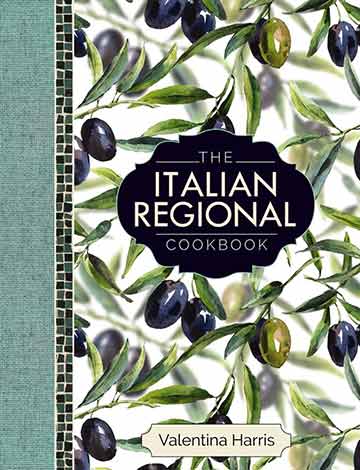
Nutrition
Nutrition information is automatically calculated, so should only be used as an approximation.
Recipe Testers’ Reviews
Select a Tester
I couldn’t stop eating this panna cotta. It’s silky, a little sweet, creamy, and super easy to make.
I couldn’t find light cream at any grocery story in town so I used 2 cups heavy cream and 2 cups of 1/2 and 1/2. I also used powdered gelatin and regular granulated sugar. I added 2 teaspoons vanilla extract to the cream mixture.
I let them set overnight and they did come out intact. And now I cannot stop stealing bites of it. This panna cotta is so, so good.
Simple and delicious! This is a perfect recipe for an easy dessert that will impress your guests! I flavored my cream with strong coffee and served it topped with a mixtures of roasted cacao, toasted nuts, and shaved dark chocolate.
It took an hour to completely cool the cream. I then refrigerated it for 6 hours and they came out beautifully. The recipe made 10 servings.
I used individual nonstick ramekin molds and poured the mixture equally among 8 molds.
I used 3 sheets of gelatin. The recipe doesn’t say to presoak the gelatin in water to soften it and it felt strange putting unsoaked sheets straight into the cream. However, it still worked. I left the panna cotta overnight in the fridge to set.
After standing the molds in water for 5 seconds, the panna cotta generally came out cleanly. Sometimes I had to stand the mold for an additional 5 seconds if the dessert didn’t come out on the first attempt.
I got 8 good servings from the recipe. I did not try any of the flavorings suggested. The desserts were wonderful, lightly flavored with sugar, and just set with a wobble. They looked like crème caramel with the caramel on the top and around the edges.
I would definitely make this again and would recommend it to others.
